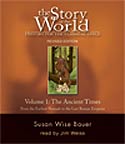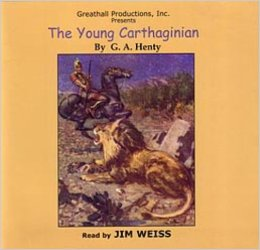Jim Weiss is beloved in many homes for his warm, ailment original literary storytelling and audiobook recordings. Although he is probably best known in homeschooling circles for his reading of Susan Wise Bauer’s The Story of the World series, store he has also won over a hundred awards from national organizations representing parents, librarians, homeschoolers, and many others. He and his wife Randy share a passion for good stories, well told, and this is evident in both the literature he chooses and the way he tells the story. His use of unhurried pacing allows the listener to absorb details he or she might otherwise skim over, and his creative use of voices and accents is delightful.
Today we have the privilege of hearing from Jim Weiss. Reviews of several of his audiobooks will follow in the coming weeks, as well as a great giveaway!
 1. How did you become a professional storyteller?
1. How did you become a professional storyteller?
2. How do you choose which stories to tell?
As far as recordings go, Randy and I talk this over each year. Rule #1 is that it has to be a story I love. Rule #2 is that it has to be based on great literature or history. After that, it’s partly a question of “what have we NOT done for a while?”
 3. How were you selected to read Susan Wise Bauer’s The Story of the World series?
3. How were you selected to read Susan Wise Bauer’s The Story of the World series?
Before Susan and I ever met, she home educated her kids using my recordings. Randy and I became friends with Susan and her husband after we started to meet at home education conferences. When Susan was ready for an audio of The Story of the World, it was a natural progression. Since then, I’ve recorded many things for her company, and she and I together have taught mini-conferences for parents.
4. How do you keep track of the voices for different characters?
I don’t keep track of characters; they keep track of me. They are so clear to me that I just let them speak and the voices appear. Only once in a great while do I have to struggle to find an appropriate voice to fit a particular character or have problems recalling a voice. Of course, if I retell a story for a live performance and have not told that one for some years, the voice may be a bit different from that on the recording, but that seldom happens with main characters.
5. What were some of your favorite books when you were growing up?
The Three Musketeers. Richard Halliburton’s Book of Marvels. Edgar Rice Burroughs’ series about John Carter of Mars, which are junk, but really fun, especially for readers of a certain age.
6. What are some of your favorite recordings?
I don’t have favorites among my own recordings. Unless I love it, I don’t record it so all of them are favorites. As for other readers, I admit that I seldom listen though there are some marvelous voice actors out there. But I spend so much time with stories that I listen to music, or sing to some of my favorites, or listen to NPR, when I drive.
7. What is the hardest thing about being a storyteller?
The hardest thing was traveling extensively. Being away from my family was tough when I was at the peak of my time on the road— I have since cut back on touring somewhat. The performing, teaching, and interacting was always a delight. It was the grind of the actual travel process that was tough.
8. What do you like best about it?
I love working with my wife as my business partner. (Randy runs the business side of Greathall.) I love sharing my love of the story characters, whom I consider my friends, with other people. I love seeing the impact the stories have on listeners, both in terms of literacy and in terms of character/ethical development. It’s really fun to perform, too.
9. How does storytelling compare to reading for an audiobook?
When I read from a script— my own, or an author’s—I have already made notes on the characters, their voices, and their places in the story, and even on how I want to deliver some of the lines. When I tell a story, everything else flies out the window, and I just let it flow through me. I am working “on the fly” to keep everything connected, and I don’t try to remember exact words. I just tell it.
10. What are you working on now?
11. What are some of your other interests?
Music. Reading (no surprise!). My wife, and our daughter and son-in-law, of course. Japanese gardens and Japanese haiku poetry. Other poetry, too, come to think of it. History, and applying its lessons to current events.
12. What inspired you to record the Henty books?
I began recording the Henty books because of a colleague we had met at some home education conferences. It was he who brought back Henty to print and began marketing them to home educators in particular. Henty in his own time was a household name. (Randy and I even heard him mentioned in passing in an episode of Downton Abbey.) This gentleman had grown up with the original books, with his own father reading them aloud to the family. Now, years later, he (the son) began to publish the books, and asked me to record The Cat of Bubastes, for which he supplied me with an edited script. I enjoyed it, and we decided to proceed with Wulf the Saxon. He loved the recordings but decided he didn’t want to continue producing them. So we bought those first two and kept going using my own scripts, doing one each year for a number of years, along with our other Greathall titles.
Henty dictated his books at machine-gun speed (he needed more than one secretary because one couldn’t keep up) and sometimes repeated himself, or went off on major tangents. I abridged those parts only and left the rest, selecting titles based partly on a desire to vary the settings and eras and partly on which ones I most enjoyed. I recorded For the Temple when the archaeology museum at Emory University in Atlanta asked me to present a three-week residency in conjunction with a special exhibit of items from the fall of the Second Holy Temple. I used the Henty book as part of my research, as it was based on the eyewitness account of Flavius Josephus.
I haven’t recorded any Henty books for a few years because I was involved with other full-length projects, but would love to return to them, as the stories, the moral element, and the characters are wonderful. These are, however, big projects. Not counting the prep time, I spend a full month in the studio recording, editing and mastering a Henty volume. However, Randy and I are talking about continuing so I’m examining different titles for future recordings.
13. How can parents and students learn to put more drama in their reading?
Here are a few tips. First, remove any pressure to do it “perfectly” because you never will, and all you will do is take the pleasure and spontaneity out of it. This should be fun for you, as well as for your listener(s).
Second—the unbreakable rule—read aloud only stories you enjoy yourself; the others always fall flat, whereas anything you love will prove more interesting just by virtue of your enthusiasm.
Third, ask yourself, “What is it about each character that I want my listeners to know? How can I convey this quality through his/her voice, perhaps altering the pitch, pace, volume, etc. a bit to delineate one character from another?” Don’t worry too much about creating detailed voices for characters who show up only for a sentence or two. For the sort of reading we are discussing here, as opposed to an audio recording, you want to focus on main characters’ voices and personalities.
Ask yourself also, “How can I shape my pacing to preserve on an auditory level the overall mood in which the author has written this story? Is this a mile-a-minute story? Is it more of a gradual, Mark Twain-type story in which I want to briefly pause at certain moments to let the dry humor work its magic?”
Thanks, Jim! We look forward to hearing more from you. There is always something new to discover at Greathall!
Now readers, it’s your turn! Which of Jim’s recordings are your favorites? Which stories do you most enjoy reading aloud and telling with drama and expression?
Remember to watch Redeemed Reader for upcoming audiobook reviews read by Jim Weiss in the coming weeks, and for the giveaway…
Support our writers and help keep Redeemed Reader ad-free by joining the Redeemed Reader Fellowship.
Stay Up to Date!
Get the information you need to make wise choices about books for your children and teens.
Our weekly newsletter includes our latest reviews, related links from around the web, a featured book list, book trivia, and more. We never sell your information. You may unsubscribe at any time.
We'd love to hear from you!
Our comments are now limited to our members (both Silver and Golden Key). Members, you just need to log in with your normal log-in credentials!
Not a member yet? You can join the Silver Key ($2.99/month) for a free 2-week trial. Cancel at any time. Find out more about membership here.
1 Comments
Leave a Comment
You must be logged in to post a comment.





Fascinating interview of Jim Weiss–I loved learning about his personal story! We love his audio of The Story of World series and listen to them on car trips.